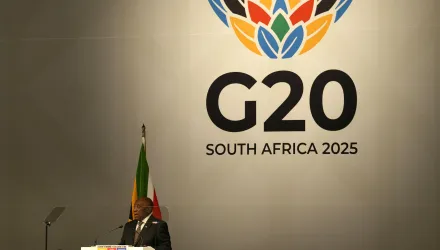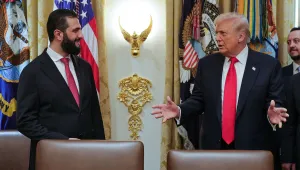On September 30, 2021, Tarek Masoud, Faculty Director of the Harvard Kennedy School’s Middle East Initiative (MEI), hosted Dr. Thomas Hegghammer, Senior Research Fellow at the Norwegian Defence Research Establishment, for a presentation on the future of global jihadism.
Hegghammer focused on the power of academic predictions and the importance of their accuracy. Reflecting honestly on his work, he cited some of his own failed predictions about jihadism; in 2010, for example, he wrongly predicted that jihadists would not turn to Facebook due the security challenges it presented. “It could be me who’s just cognitively challenged,” quipped Hegghammer, “but I have a sense that I’m not the only one who can’t get to grips with this thing.”
Hegghammer expressed particular concern over the lack of accountability in the field and emphasized the importance of acknowledging the implications of faulty predictions. “There is a risk that [when academics] engage in speculations, bad predictions... [their] statements can be used to inform decisions with very grave consequences,” he said.
Having seen how academics in the field of jihadism, himself included, have struggled to predict the trajectory of jihadism, Hegghammer outlined what he sees as some of the most troublesome factors.
First, information gaps: terrorists and terrorist groups “close themselves partially to the world and are selective in their information intake,” he said. Second, terrorist groups “thrive in and around conflict, and conflicts are hard to predict.”
Third, the small scale of jihadist groups creates more room for select personalities to dominate, and increases sensitivity to technological innovations that allow groups to more effectively disseminate information and protect themselves from authorities.
Fourth, Hegghammer maintains that academics forget the broader “game” jihadists are playing, saying, “we forget that [jihadists] are in a strategy game with governments and what they do depends on what we do.” He admitted that even he had “underestimated the length to which European governments would break norms and rules and previously declared ethical principles to defeat [the Islamic State].”
He closed with a call to action for academics to return to the foundational principles of political science methodology: through rigor and specificity, use of good data, systematic approaches, and transparent models, he believes that scholars can improve the accuracy of their claims.
“We do a bit too much prediction in the wider field of jihadi studies and analysis, but there is a place for it if it’s done well and it can help us improve our understanding of the phenomenon,” he said.
Watch the recording of this event here.


